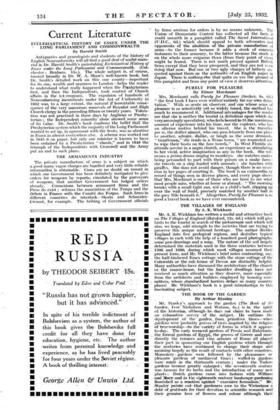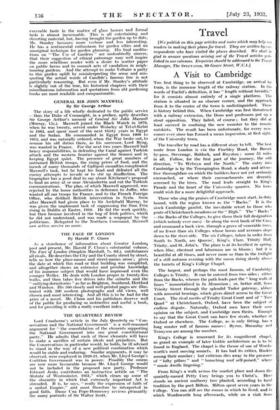THE BOOK OF THE GARDEN . Arthur Stanley
Mr. Stanley's approach to the garden (The - Book of the Garden, Ivor Nicholson and Watson, 6s.) is in the spirit of the historian, although.he.-does not claim to have made an exhaustive survey of the subject. He outlines the deyelopuient of the garden from. primitive times—when gardens were probably groves of trees inspired by the religion of treezworship—Acr the-variety of forms in which it appears to-day. The early terraced gardens of Persia and Babylonia, _the formal gardens of Egypt, the graves of Greece and more directly the terraces and vine arbours of Rome all played their part in sponsoring our English gardens which through the centuries have dontintied to change their shape and metining largely as the remit of contacts with other countries. Monastery gardens were followed by .the pleasaunee or pk‘asure gardens of media-. eval times ; walled-in gardens were- made in the thirteenth , century ; under the Tudors gardens became greatly enlarged ;- the- seventeenth century was famous for its herbs and the introduction of many new plants ; Dutch gardens came into fashion with William --and Mary-and in the eighteenth century- landscape-gardening flourished as a reaction against "excessive formalism. Mr. Stanley points out- that gardeners- owe- to the Wietorians a debt of gratitude for their devotion to scientific research and their genuine love of flowers and colour although their
execrable taste in the matter of glass houses and formal beds is almost inexcusable. This is all entertaining and diverting material, but, having brought the garden up to date, Mr. Stanley becomes more verbose and less interesting. He has a sentimental enthusiasm for garden cities and an unoriginal technique for garden planning. His final medita- tions on "The Use of Gardens" are undoubtedly sincere, that their suggestion of ethical patronage may well inspire the more rebellious reader with a desire to scatter paper on public lawns and to commit acts of vandalism in neigh- bouring gardens. And the attempt to make Voltaire a party to this garden uplift by misinterpreting the sense and mis- quoting the actual words of Candide's famous line is not particularly reassuring. But even if Mr. Stanley's attitude is slightly out of the true, his historical chapters with their miscellaneous information and quotations from old gardening books are most readable and companionable.















































 Previous page
Previous page